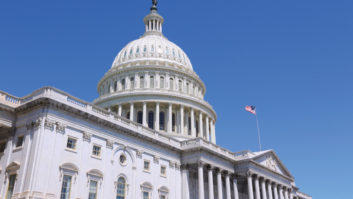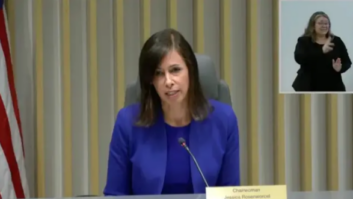It can be difficult to remain in compliance with FCC rules if some of them do not actually appear on the books. A case in point are rules that cover foreign ownership of broadcast and other licenses.
At its April meeting, the FCC on Tuesday opened a notice of proposed rulemaking by unanimous vote. The goal: to codify certain rules about foreign ownership of broadcast, common carrier wireless and common carrier aeronautical licensees.
Chairman Brendan Carr said in a statement that the existence of unwritten or uncodified rules impairs efficiency, risks inconsistent outcomes, needlessly raises costs and wastes staff resources.
The agency regulates foreign ownership in U.S. broadcast licenses, with limits on direct and indirect ownership. Currently, a petitioner must request specific approval for all foreign individuals and entities that will have more than a 5 percent direct or indirect equity and/or voting interest in the controlling U.S. parent, according to the FCC.
Its rules limit foreign investment to 25%, but in 2013, the commission opened the door to 100% foreign ownership on a case-by-case basis, via a declaratory ruling process. And the commission says that more recently, it has developed policies and precedent to implement foreign ownership rules but in some cases never codified them.
Increasingly, it says, the FCC faces complex foreign ownership structures when it comes to investment in publicly and privately held U.S. broadcasters.
In the NPRM, the commission states that it supports robust foreign investment, which “can help foster technical innovation, create jobs and ultimately increase U.S. economic growth.” However, it says certain investment, particularly from hostile countries, may raise national security risks and other concerns. It said the situation calls for clarification.
Carr says the FCC over the past decade has approved many transactions involving foreign investment in which the commission considered new questions about the meaning of its rules. “That is a good thing, but in many cases, we never codified those decisions or regulations,” he said.
He called that “an exercise in good government,” but continued, “Good government also means simplifying outdated rules when possible, and we will take that opportunity here, too. To that end, we propose streamlining our review process.”
The language of the NPRM gets pretty legalistic. For example, on its list of considerations and next steps, the FCC seeks to clarify its advance approval rules regarding certain “deemed voting interests.” In determining how much indirect foreign ownership constitutes control over a licensee, the FCC distinguishes between deemed and actual voting interests.
[Read the draft of the NPRM as released by the FCC prior to the vote.]
“We also seek comment on whether we should extend the commission’s remedial process, currently available only to publicly held companies, to privately held companies,” the FCC wrote.
It is also considering measures to require identification of trusts and trustees in proposed investments, and whether to allow broadcasters to request advance approval for foreign investors who have previously gone through the FCC’s vetting process.
The FCC also proposes that the lack of a U.S. residence for a foreign investor is not a factor to be considered in the FCC’s assessment of whether a petition for declaratory ruling is in the public interest. “We believe requiring a foreign investor to maintain U.S. residence would be contrary to the commission’s policy of allowing certain levels of foreign ownership that are not contrary to the public interest,” it wrote.
In addition, the NPRM asks for comment on foreign ownership considerations related to the processing of applications for noncommercial educational and low-power FM stations in competitive filing windows.
“While to date there have been relatively few instances of requests for proposed foreign ownership of NCE and LPFM stations under the commission’s current foreign ownership rules, we believe it would be beneficial to consider how to incorporate the structures of these stations into the current rules,” it wrote.
The FCC note that LPFM and NCE stations often have leadership composed of boards rather than shareholders. It proposes to attribute equal voting shares to board members unless agreements specify differently.
As part of the proceeding, the agency will take public comment on a number of other broad topics on foreign ownership, including alleviating unnecessary regulatory burdens, filing of amendments, and processing broadcast applications during the remedial process.
Comment deadlines for GN Docket No. 25-149 will be established once the NPRM is published in the Federal Register.





